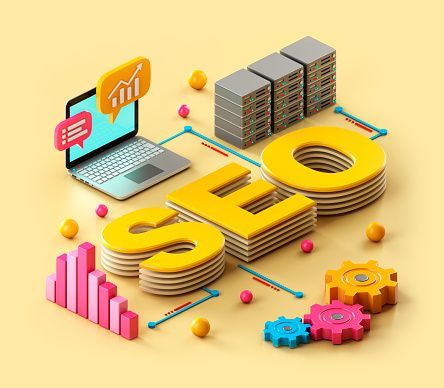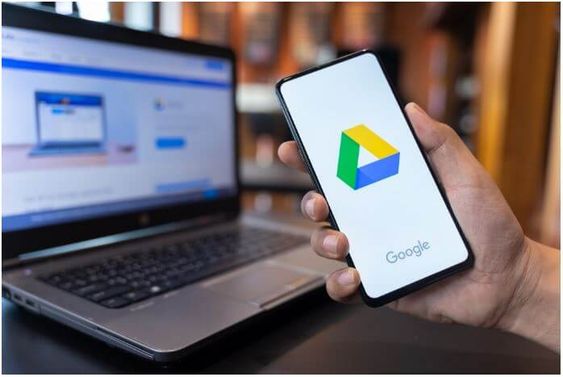How local SEO works: An Introductory Guide to Local SEO
Local SEO is often ignored by small businesses, but it is probably the most important strategy to help the business grow. Investing in Local SEO will increase awareness and increase visits to physical stores.
72% of local Google searches resulted in a visit to a store, and around 56% of local businesses do not have a Google My Business listing. Local SEO is hugely important, and its relevance has been made even more prevalent during the global pandemic as travelling has been limited and people are being pushed to buy around their neighbourhood.
Having a business listing on search engine platforms should be the first concern of every business, and it is the easiest thing to do. If you have not yet claimed your business on Google, Bing or any other search engine platform, you should do so now.
If you have doubts about this topic, keep reading this article. Here, we’ll explain the best way, and in a simple way, how local SEO works, specifically on Google. Then we’ll talk about how to boost your business’s online presence to drive visits to your brick-and-mortar shop.
Table of Contents:
- What is local SEO?
- How local SEO works and how you can do it.
- Claim your business on Google My Business.
- Invite customer reviews and answer questions.
- Focus on Link Building.
- Add rich media such as photos, videos, and audio files.
What is local SEO?
Local SEO is one of those terms that most people may not have heard of but have certainly interacted with. If you are an eager web user to search for things around you, you might have come across results nourished by local SEO.
To put it in simpler words, we will give you an example:
John heads downtown to meet his friends for dinner. However, they could not decide where to eat, but they all agree it should be Italian food. When John meets his friends, he pulls out his phone from his pockets and starts typing on google “Italian food” or “Italian restaurants nearby”. As soon as he presses “search”, he comes across several Italian restaurants around his area.
That is local SEO. Local SEO is several different strategies that aim to drive awareness, traffic, leads, and sales to a local business. Local SEO increases visits to physical stores.
On a closing note, we should not forget that local SEO is not only about having Google My Business (GMB) account. Local SEO is just SEO. It is a branch of the overall strategy of search engine optimisation and, in this case, with a focus on local. Therefore, depending on the company, a complete SEO strategy must include its local strategies.
How local SEO works and how you can do it:
Like general SEO, local SEO works on unique factors that affect your business’ position on the search engine results page (SERP). Among other factors, you can appear in local search rankings by noting relevant keywords, location, links, content, on-page and technical SEO, and website authority. What’s important to retain is that everything – keywords, links, and content – should have a local focus.
As Google says, your local ranking is determined by:
- Relevance – Does your business match what the person is searching for? That is where all the work in your SEO pays off.
- Distance – How far is the person from your shop’s location? That is why you should have a listing in directories like GMB. Your site should have local keywords and your location.
- Prominence – How often is your business talked up? Here the magnitude of your online presence counts, and link-building becomes crucial.
1. Claim your business on Google My Business.
Yes, adding your business to Google is a huge step, but it is not enough. The page must be verified, complete with all information about your business and using relevant local keywords in the description.
The business name, physical address, phone number, business hours, categories and attributes must be up to date and match your website to let Google know it is legitimate.
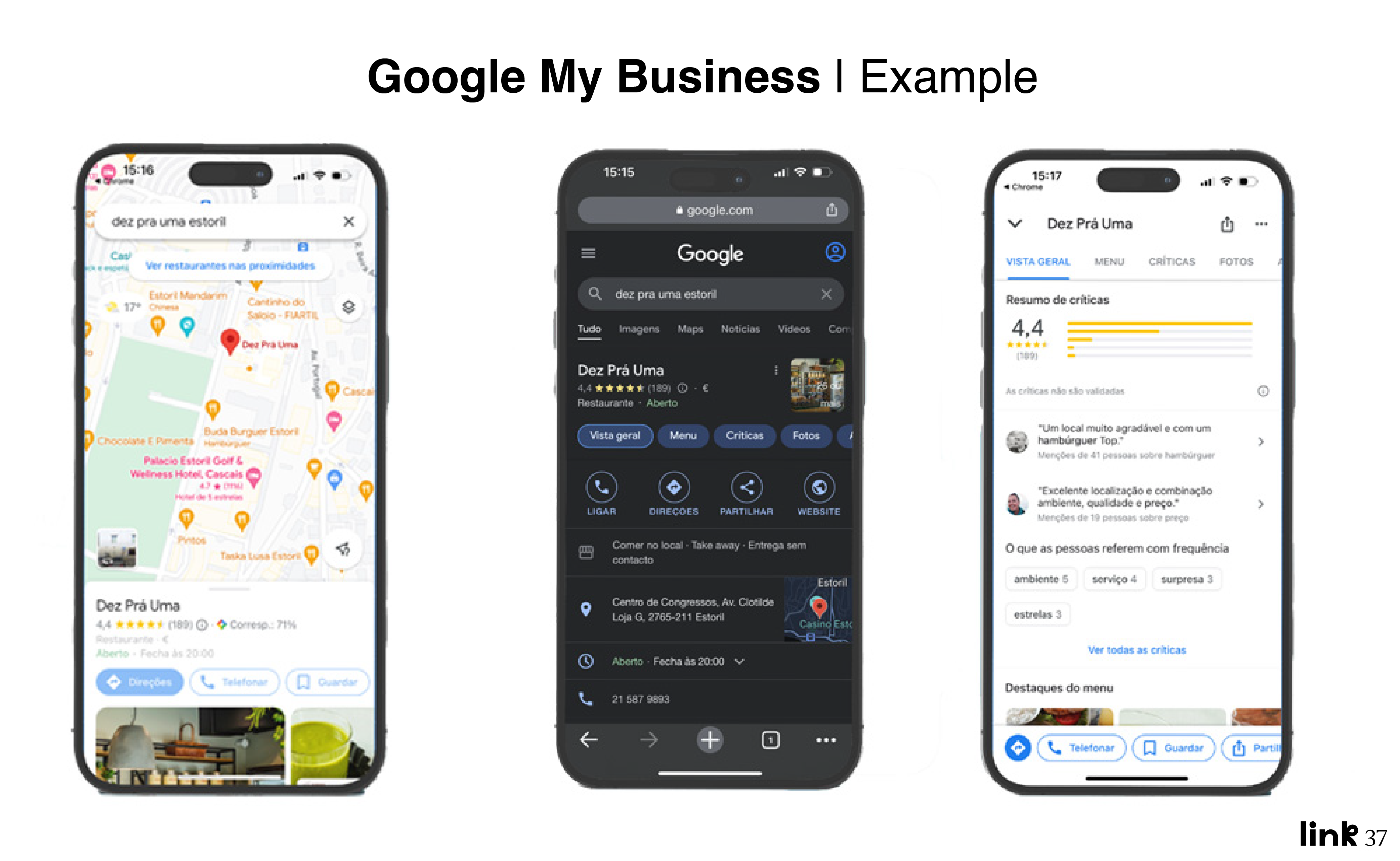
Take this restaurant, Dez Prá Uma, with several locations in Lisbon and Estoril, for example. Their listing is a fine example of a well-used GMB profile, with complete business information, categories and attributes.
Business categories help Google rank your business so that when someone searches for, say, “restaurants near me” your restaurant comes through on the results page.
A helpful tip is to be specific with your category. For example, if you run an Italian restaurant, then rather than just using “Restaurant” as your category, use “Italian restaurant” or “Pizzeria” (if you mainly sell pizza).
Alternatively, attributes provide detailed information about your service, for example, service options, amenities and accessibility options. Attributes are being continuously updated by Google as consumer behaviour changes. For instance, during this pandemic, Google added specific attributes to address the situation, such as “Contactless delivery”.
Example of the service options:
Takeaway
Lunch
Eat on site
Delivery
Non-contact delivery
Example of facilities:
Suitable for children;
Restaurant;
Public toilet.
Example accessibility options:
With wheelchair-accessible parking.
Wheelchair Accessible Elevator
Wheelchair Accessible Entrance
Wheelchair Accessible Public Toilet
2. Invite customer reviews and answer questions
As mentioned earlier, Google’s algorithm rewards top spots. A part of the highlight points comes from the recognition the business has gained, and customer reviews and ratings represent this.
To improve your search engine ranking, you need to have a good number of reviews, preferably positive ones, and very high ratings. Using keywords in those ratings will also help increase your ranking.
Tip: Don’t forget to remind your customers before they leave your shop to provide a review and google ranking. Other ways would be to include this request in a newsletter or on social media.
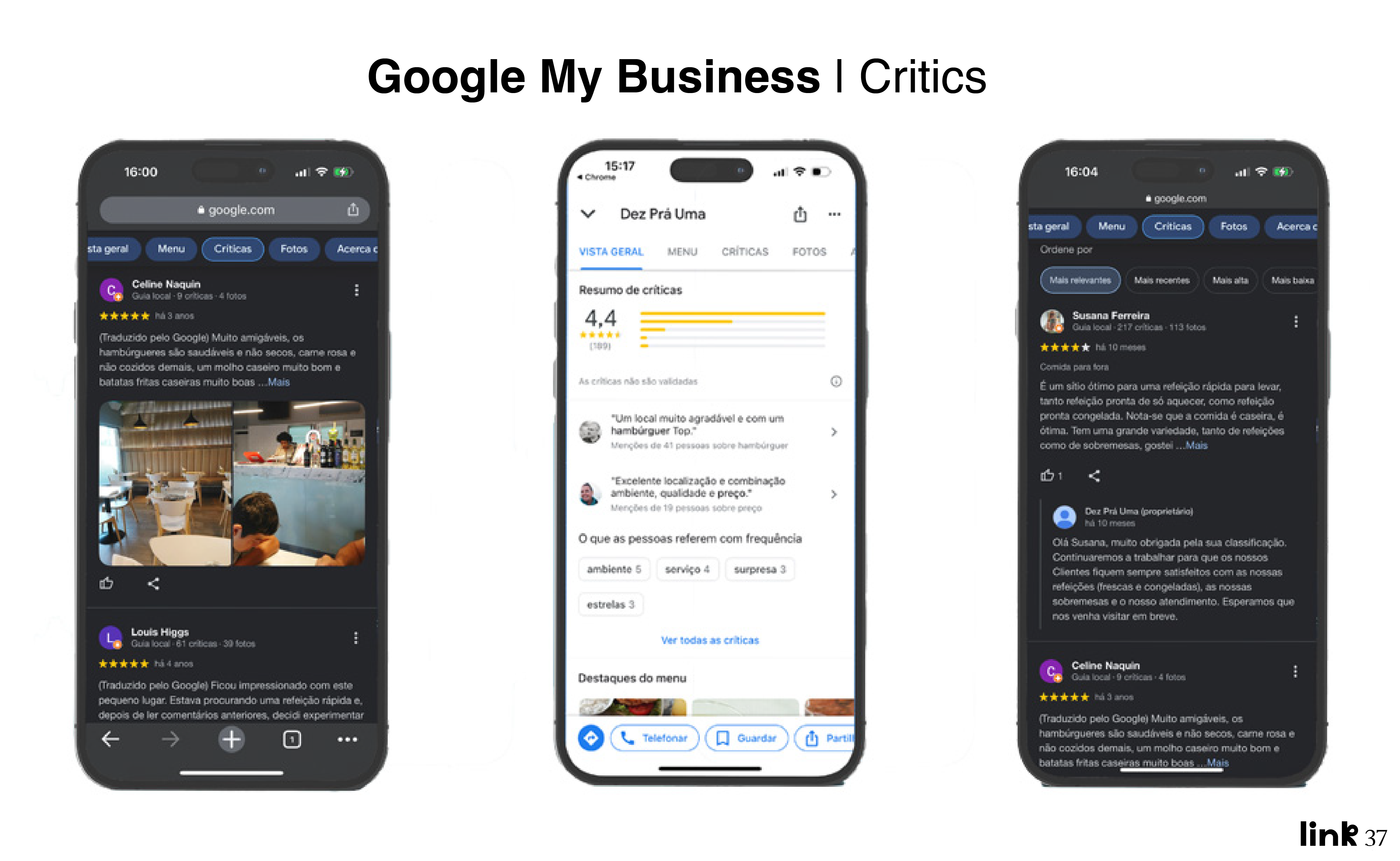
This strategy is not exclusive to GMB reviews. Ratings on your website and other review sites are equally important in helping your business rank in the results pages. In addition, you can link reviews on those sites to your GMB listing.
3. Focus on Link Building
Like general SEO, link building is also crucial for local SEO. Link building is, in short, the strategy of getting other sites to reference your site.
Why is this important? One of the main factors of Google’s local search ranking is the quality of content. Google measures this by looking for sites mentioned by other prominent sites. If your website is worthy of citation on many other websites, it means that the content you provide is both good and trustworthy. Therefore, link building is another way to improve your ranking points for local SEO rankings.
Keep in mind that this is true as long as your links were naturally sourced or added to websites with purpose and not that they are spam. Also, don’t buy or trade links as they decrease link quality and rankings in Google. The most relevant links are from websites within your industry or articles related to your business.
Here are some ways to build your links:
- Directories
Adding your business to a directory is a great way to start building links and getting your business known. However, it can’t be just any directory. Building links in low-quality directories will hurt your ranking.
Find trusted directories that revolve around your business segment and industry. For example, if you have a restaurant or cafe, it’s good to start with review sites like Yelp, Zomato and Trip Advisor. In the hotel industry, there is Booking.com, Trip Advisor, Expedia, and Hostels.com, among others. For businesses in general, building an account on GMB, Yellow Pages, and the Chamber of Commerce directory is also a good start.
2. Social networking
Having a social media page is a must for any business. Create accounts on Facebook, Instagram, Twitter and other social media platforms that resonate with your business, for example, Pinterest for interior design, LinkedIn for consultants or Reddit for gaming-related business.
You must add complete information about your business to increase the relevance of your page.
3. News and articles
Getting links from relevant articles and recognised local media is the best way for Google to know that your page is relevant to an individual’s query on your platform. So, you’ll need to get people talking about your business. You can do this by showcasing some awesome work, showing expertise in your field, hosting events, engaging with your community, having sponsorships, etc.
4. Add rich media such as photos, videos, and audio files.
Add photos and videos about your business, the products you sell, your service and your shop.
Google is working on its platform to do zero-click searches. That essentially means that when someone types something into Google, the search engine tries to display all the information on the first page. These can be displayed in featured snippets, images, videos or your GMB page.
Images and videos also rank in Google, and by adding them to your website and your GMB account, your ranking will improve significantly.
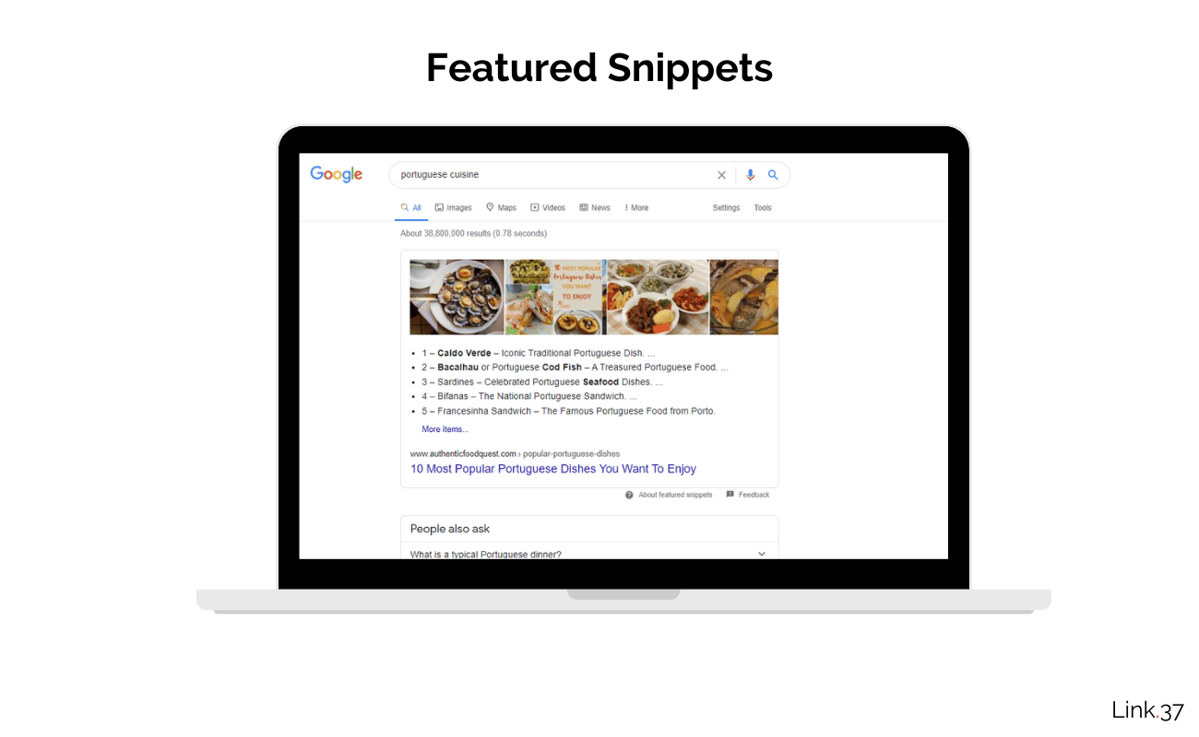
Images and videos also rank on Google, and by adding them to your website, and your GMB account, your ranking will improve significantly.
Also, adding them to your GMB account will give your customers a good view of what you sell and will thus increase the chances of getting visits to your physical location.
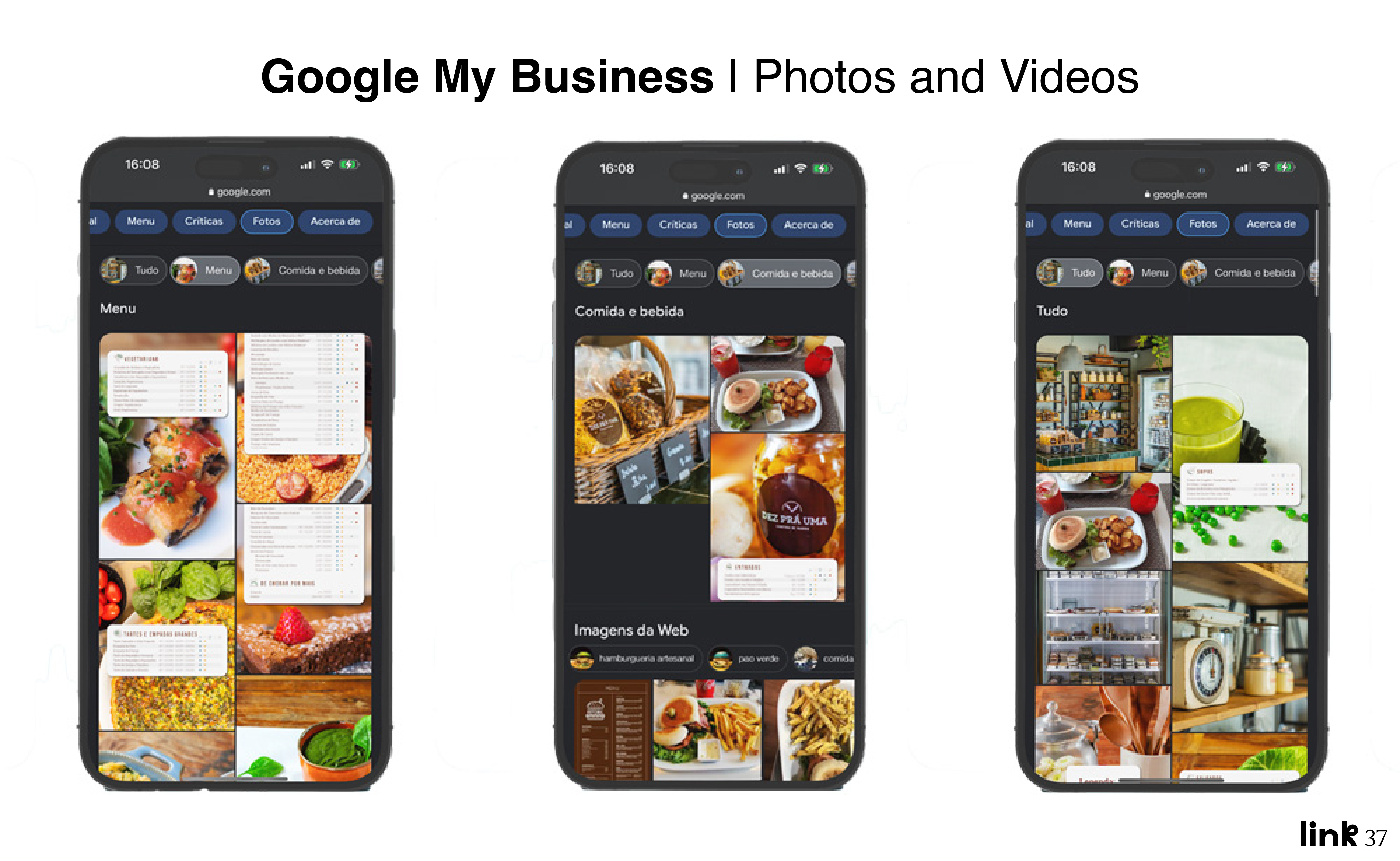
While this is just an introductory guide, this information can be overwhelming to learn at once. There is a lot of work to plan and execute a successful local SEO strategy that manages to cover everything.
That is what we do best at Link37! We help our clients design a comprehensive digital marketing plan to increase their online presence. Book a meeting with us to start planning your strategy!
LAST UPDATE ON MARCH 2024


